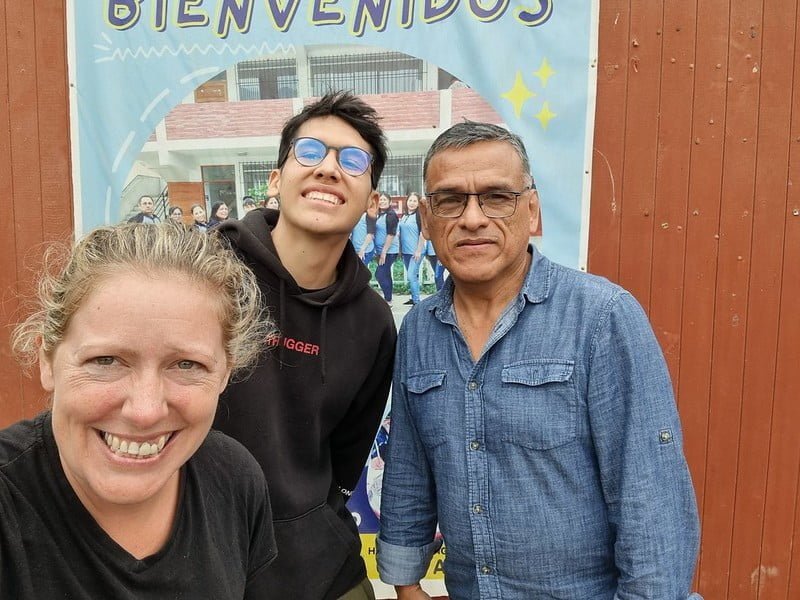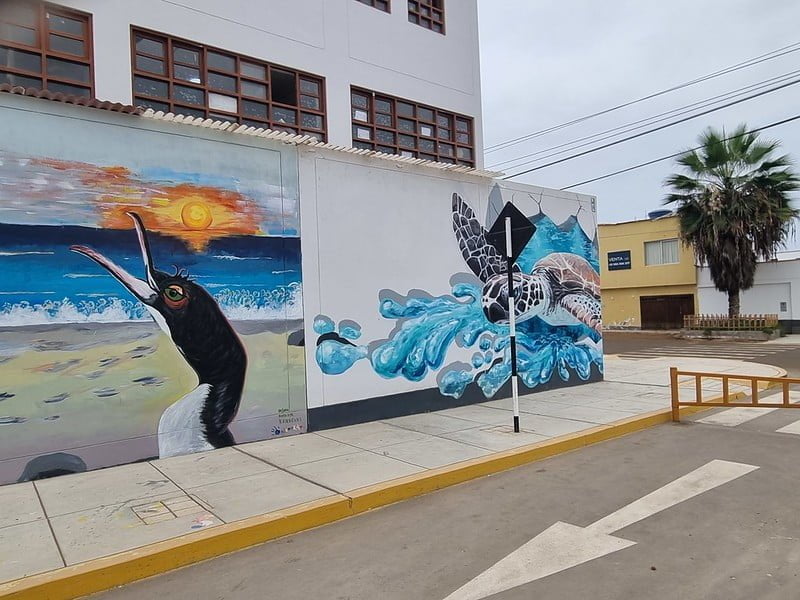By Susie Ventris-Field
Through the Welsh Government funded Taith programme, we’re able to offer young people in Wales and from around the world, some truly incredible opportunities. Our Chief Executive recently visited two of our project locations to exchange ideas and collaborate with our new Taith partners – Vivé Mexico in Morelia, Mexico and BVBP in Lima, Peru. Here are a few things she learned on her travels.
Innovation at Vivé Mexico
My first stop was Vivé Mexico in Morelia, Mexico. They work in partnership with Universities and Youth Ministries to send up to 4000 young people on international exchanges every year, while also welcoming international volunteers to exchange projects with partners in Mexico. There were huge learning opportunities from Vivé Mexico’s innovation:

- Volunteer journey systems: Vivé Mexico invest in a staff member who develops and maintains a bespoke volunteer management system. This user-friendly system allows journey tracking of the large number of volunteers that Vivé Mexico works with.
- Volunteer distance learning: It hopefully goes without saying that Mexico is large – it’s not possible to deliver face to face pre-departure and debriefing training to the thousands of volunteers Vivé Mexico sends. They therefore have an online training package. After selection of volunteers by universities and Youth Ministries, volunteers take online 7-hour preparation course, reinforcing messages that the exchange experiences are not voluntourism, but global service and citizenship. Once this is complete, volunteers can select a volunteer programme and apply. There is then specific training to prepare for the exchange. Volunteers can use this training towards an accredited diploma.
- Competences, employability and global citizenship: Like WCIA, Vivé Mexico embed the development of competencies into their programmes. There is recognition from the Mexican Government that international exchange develops competencies that support employability and promote alternative routes than crime (particularly drug-related crime) for the large population of young people in Mexico. We were able to learn about Vivé Mexico’s approach to measuring competencies and share our Global STEPS self-assessment for employability competencies (which is available in Spanish, English and several other languages) and also shared a number of tools we use to measure changes in values and attitudes.
- Efficiency in funding and travel: Young people travelling need to raise some of their own finance, so Vivé Mexico have a programme called Vivé Finance. They have a trusted partner where young people can chose to borrow money for travel costs and pay this back with lower interest. Their Vivé Assist programme offers travel insurance and travel agency help to young people as they make their arrangements to travel on their placements. Given the amount of administration time many youth organisations in Wales spend on making travel and travel insurance arrangements for international exchange, this approach could be of value.
While in Morelia, through some early-morning jogs, I had a chance to explore the historic and well-preserved city centre, including one unique morning where traffic was not permitted in the city. The Vivé Mexico team were also kind enough to take me out for several phenomenal meals where I had the chance to try food and drink from the region.

Turtle Workcamp, Rincón de Guayabitos, Mexico
From Morelia, I headed on the most comfortable bus I’ve ever travelled on to Rincón de Guayabitos, to see one of the workcamps offered by Vivé Mexico in co-ordination with their local partners. Volunteers from Wales would participate in this project to protect the turtle population and to help keep the beaches clean.
Rincón de Guayabitos is a tourist destination in Mexico with long, beautiful beaches and a lively nightlife. I was in the wrong season to see turtles but did get to see a huge number and diversity of crabs and butterflies. I also enjoyed doing a couple of litter picks with Armando and noticed similar issues on the beaches as we see back home in Wales – people leaving behind plastic bottles and other litter, with little awareness or care of the damage it can do to the ecosystem.
As an international exchange opportunity, this camp was impressive for how self-contained and relatively straight-forward it was. Volunteers stay and have meals in a hotel a few minutes walk from the beach and are based in a safe and lively town. They take turns on nightshifts collecting and protecting turtle eggs and, when the time is right, re-releasing the turtles into the ocean. They also get the expertise and insight of marine biologist Armando about turtles but also other marine species.

BVBP, Peru
From Mexico, I travelled to Lima in Peru to meet with Brigada de Voluntarios Bolivarianos del Perú (BVBP) to hear more about their work, and to visit two international exchange projects where we are sending young people from Wales later this year and in 2024.
I was inspired by BVBP’s youth and volunteer-led approach and their focus on working with disadvantaged young people. They have eight volunteer-run subsidiaries across the country who prepare activities and exchange opportunities in their communities. They have a National Congress every year where the subsidiaries come together to share and learn. On my first night in Lima, I was invited to a theatre production created with disadvantaged young people showcasing dance and music from the different regions of Peru and other parts of South and Central America. I can’t think of a better way to be introduced to Peru!
I also found time to try the famous ceviche in Lima and to do some early morning and late evening explorations through walking and jogging, especially along the coastal area of Barranco and Mira Florez.
A group of BVBP staff and volunteers kindly gave up their Friday evening to participate in a Futures workshop that I ran, exploring the world they want not only for their community but for Peru and the world in 50 years. Key themes that came up were the removal of border control to allow everyone to travel, a focus on the mental health of young people, the importance of tackling the nature and climate emergencies, and the role of artificial intelligence.

Pachacamac education projects – Educating for the Future
One placement for volunteers from Wales will be in the Santa Maria Reyna school in Quebrada Verde just outside Lima. It’s a primary and secondary school and volunteers will be supporting teachers in delivering English and other extra-curricular activities. I was privileged enough to see two classes being taught and to meet the school Director. The discussions during the day centred on the importance of volunteers working closely with the teachers to ensure the curriculum is delivered. Class sizes are quite small so a fantastic environment to be volunteering in and the school itself is set in a beautiful location on the side of a mountain. Volunteers stay with highly experienced host families in the nearby town of Pachacamac. In several discussions, as in Mexico, the topic of voluntourism came up, and how it’s important that volunteers coming to projects understand it is a citizenship service not a tourism opportunity, and that this requires a certain level of commitment.
Punta Negra environmental project – Speakers of the Sea (Voceros del Mar)
My second project visit was to Punta Negra town and beach. A stunning setting, this project involves campaigning to protect the marine wildlife, observing and documenting wildlife and running education activities with locals and visitors to protect the marine wildlife in the area, including mural painting.

While I was on this visit, I was very aware that Climate Cymru was doing a Green Tour of Wales visiting amazing nature and climate projects run in local communities back home. What struck me on the visit to this project were some shared themes:
- The energy and drive of local people making a difference on climate and nature in their areas
- A frustration with bureaucratic processes and a lack of resource getting in the way of impact
- Feelings of isolation but a passion for getting the message of these activities to large fora like COP28
- A commitment to get the rest of the local community on board with being part of the change.
A big problem for the marine wildlife in Punta Negra is the litter on the beaches, dogs eating bird eggs and disturbing nesting birds and pollutants in the water (sun cream, plastic waste).
Return visits from Mexico and Peru
The young people who travel to all the projects I visited are going to have opportunities to meet the most incredible people and make a small difference towards our shared global sustainability goals. During this summer we have also been excited to welcome return volunteer placements to Wales from our partners Vivé Mexico and BVBP. Shirley from Vivé Mexico spent a month on placement in WCIA supporting our communications programmes (you can see more about her experience here) and Marycielo from Peru just finished supporting a futures workcamp in Bridgend.
A huge thank you to the teams at Vivé Mexico and BVBP for the warm welcome and generously sharing ideas and learning with us. Also thanks to Taith for funding the exchange.

